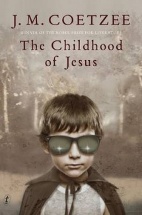The Childhood of Jesus by J.M. Coetzee

Text, 2013. ISBN 9781922079701.
(Age: Senior secondary - adult) Highly recommended. Unlike anything
I have ever read, The Childhood of Jesus by J.M. Coetzee is
a surreal alternate-world refugee fable. Simon arrives in a new
country from the camp, Belstar (could this name be an amalgam of the
notorious concentration camp Belsen and the Star of David?). He has
taken responsibility for a young boy who has been re-named David and
who has been separated from his mother. People assume that Simon is
his grandfather or father and he does take on this role whilst
trying to reunite David with his mother. He inexplicably believes
that he will know her when he sees her.
In the interim they find modest accommodation and Simon takes on the
heavy manual work of a stevedore. His companions are reasonably
helpful but not intimate. This is a bland, bloodless country,
lacking in irony, news and substance. Coetzee's genius is the
construction of a monochromatic, monotonous place which is also
interesting and intriguing.
His characters are also astonishing. Simon sees a woman playing
tennis in a closed residencia and makes the extraordinary assumption
that she is David's mother. He gives the boy to her and builds some
foreboding about her treatment of him.
David is a gifted child, winning at chess after only a few games,
but he becomes precocious and can't be educated formally. Simon
desires that David 'follow in the ways of goodness' but other
parallels with Jesus are tenuous, such as mention of being 'the
truth', reference to a carpenter and his arrival as a child in an
alien place.
Perhaps Coetzee has re-imagined some tangents of a possible life of
Jesus as a refugee to offer a vignette or profile of refugees today,
who are allowed to enter a new place but welcomed only coolly with
mediocre jobs and a hollow benevolence.
The Childhood of Jesus is a provocative, although possibly
polarising, study for high level English students or those with an
interest in refugees or religion.
Joy Lawn